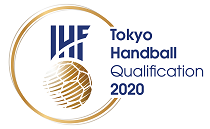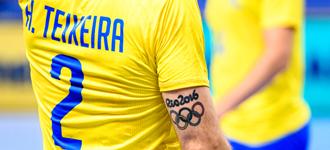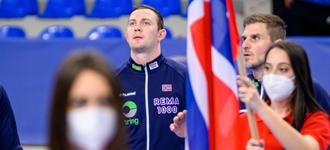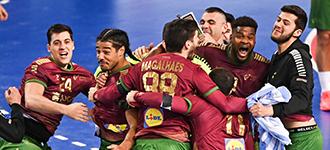Norway’s Myrhol leading hopes of 1972 repeat
13 Mar. 2021
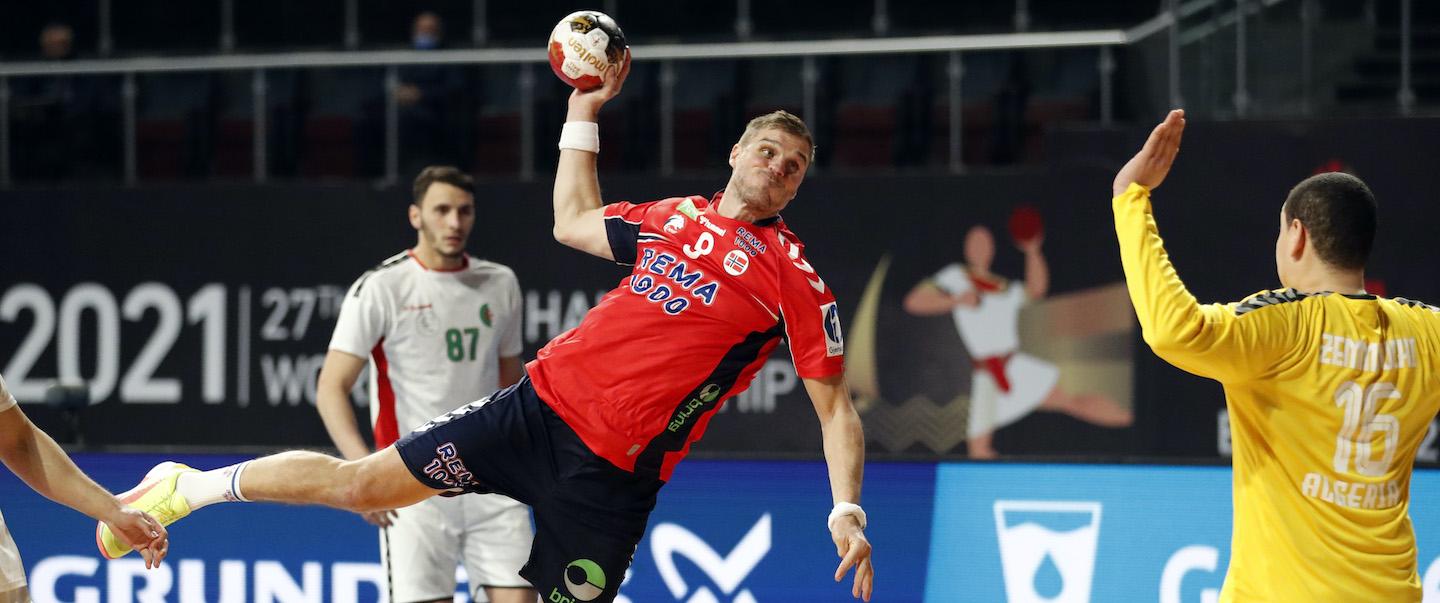
If you type in the name of Norway’s men’s handball captain Bjarte Myrhol on Google, before you click search, a number of autofill suggestions come up in the Norwegian and Danish language.
‘Kreft’ (cancer), ‘tarm’ (intestine), ‘opereret’ (operated) and ‘skade’ (hurt), give an insight into what the 38-year-old has been through both physically and mentally in his lifetime, a life which has now seen him surpass 250 games for the senior men’s national team after making his debut against Egypt back in August 2002.
Fighting on and off court
Myrhol survived testicular cancer in 2011 as well as intestinal problems in 2019 (diverticulitis) which saw him admitted to the emergency room twice in four months. Just last September he underwent shoulder surgery which saw him out of action for more than 100 days but return in time for the 2021 IHF Men’s World Championship where his role was more limited than in 2017 and 2019 when his side won silver twice.
In Egypt last January, where his side finished sixth, the Norway captain appeared in seven games but registered just more than 60 minutes of match action, scoring 12 times. Last time out, at Germany/Denmark 2019, those figures were just under four-and-a-half hours across 10 games, scoring 40 times, while at France 2017 it was just under six hours, where he scored 42 times in nine matches.
Despite the reduction in playing time – Myrhol only came on for seven minutes yesterday against Brazil in Norway’s opening Tokyo Handball Qualification 2020 win – the 1,92m line player is still standing tall, thanks to advice and help from his national team coach Christian Berge and the medical teams associated with both his country and his club, the Danish side Skjern Handbold.
“First I want to say that we have an amazing medical team both here with Norway and at my club, so I’m really happy about that,” said Myrhol to ihf.info ahead of their clash against Chile today (20:00 CET).
“But I have been unlucky the last couple of years, not only with injuries, but with this stomach issue which ruined the season,” he added.
“After last year I have had some setbacks, and I'm not playing at the same level as before due to my injuries, so I'm actually a little bit sad about that and I need to do work. I work on that on a daily basis. My shoulder problem now is what's taking most of my energy but I am working with both my physical coaches as well as mental coaches, trying to ‘fuel up’ everywhere I can.
“I've been playing in all my teams a lot since I was 19 years old, so it's a bit new situation for me [to not be playing so much], but on the other hand, I have no problems with that, because I play with so many good players.
“I don’t play in defence anymore because I'm not good enough and was number one for a long time, but there are better players now in the Norwegian team,” he continued. “The shoulder injury is a major setback for me because I cannot shoot freely and I cannot shoot without pain but Christian always knows what I can do. In Egypt I couldn't play as much because I wasn't able to use my shoulder after games, but now it's getting better.
“Now it's just my form, the other players have gone past me and I am no longer number one, but when I don't play, I support my team players. I just have to work hard to try to regain my position and that's the only thing I have in my mind; I'm always trying to improve.”
Adapting to the ‘new normal’
All teams in Podgorica are in the so-called ‘red bubble’ here in Montenegro, away from the outside world as everything is done to protect the players against any possible chance of contracting COVID-19, and for Myrhol, who is now in his third decade with Norway, it is something different and for which his team have had advice from one of the most popular sports in his home country, Nordic skiing.
“It's a brand-new situation for all of us, but I like to compare us a little bit with Nordic skiing,” said Myrhol about the new world of a COVID-19 secure environment.
“In Nordic skiing they have always been worried about washing their hands and not touching stuff at the airport etc or try to not get sick because it’s a sport where you really need your condition. They try not to travel with other people and try not to get too much contact with other people, like supporters.
“They try not to shake hands and they have always been doing that and are always taking care of themselves, so for us, of course, it's really important not to get sick so we have adapted that into handball. We are washing our hands all the time, using gel and trying to avoid contact with as much people as possible and maybe the biggest difference in the situation we are in now is, is the lack of contact with fans.”
Expectations after underachievement
Fans were also absent from Egypt 2021 where Norway equalled their second best-ever ranking in an IHF Men’s World Championship, sixth, since they first appeared back in 1958, but despite this achievement Myrhol, Berge and his teammates were disappointed and have been itching to get back on court ever since, to show – at least themselves – what they are capable of.
“I did know that as well,” said Myrhol about their world championship record. “It's good to be in such a position where, where people have expectation and we have expectations as well. That means that we have gained confidence in our team and our players.
“High expectations is a good sign that we have done something right.”
2008 and 2016 disappointment, an Olympic wait for nearly 50 years
Doing something right has certainly not been the case for the Norwegians since the qualification tournaments were introduced in 2008, with two appearances (2008, 2016) and two failures to qualify, leaving Norway’s men, currently, with a solitary 1972 Olympic Games appearance to their record.
“We are all aware of it, and it shows how difficult it is to come to the Olympics,” said Myrhol, who played in both 2008, alongside now coach Berge Lund, and in 2016. “That's why we are so happy with where the win against Brazil yesterday and why are really focused to the game today because we can secure our ticket today.
“Back in 2008 we had a really difficult qualifying group in France where we met Spain, France, and Tunisia, who almost had a home advantage [with all their fans],” said the 38-year-old. “We actually lost Glenn Solberg and Frode Hagen for this tournament, who had played in the previous European Championship a half year before so it was extremely difficult to beat France and Spain.
“We actually went a couple of goals ahead of Spain and we did a good game, I remember it very well, but in that qualification our team wasn't good enough to go through.
“It was a similar situation in 2016,” he added about the tournament held in Herning and featuring Bahrain, Croatia and host nation, Denmark.
“We had a major chance to beat Denmark in Denmark, maybe for the first time in a big game but I remember we missed two, three chances near the end and drew, it was typical [Niklas] Landin [making saves].
“After that it was really tough to play the next day against Croatia and their goalkeeper, (Ivan) Stevanovic…I think we missed about 70% of our chances, especially in the first half.
“So it's a couple of games I remember very well both in 08 and 16, so, not the proudest moments of my career, but we haven't talked about it here in Podgorica, we are just looking at it here and trying to learn from the experiences that what we are having here now.”
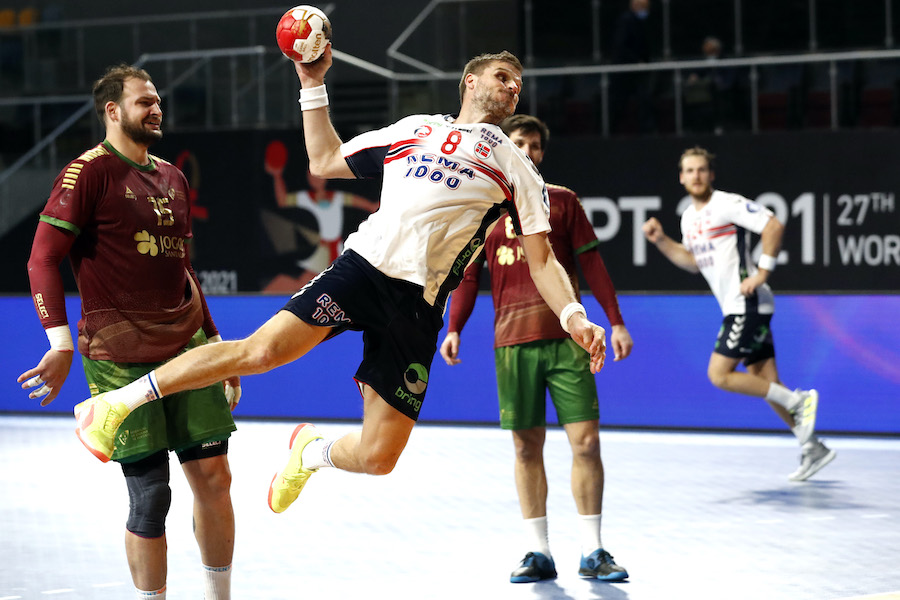
Learning from the best
When people think about Olympic handball medals and Norway, they immediately talk about the unbelievable success of the women’s side, who have qualified for seven of the last eight editions, winning six medals, including two golds.
And for Myrhol it is clear of the benefits have taken from the side, coached by Thorir Hergeirsson and who will also be aiming for Tokyo 2020 qualification in Montenegro, next week.
“The main thing we have learnt from the Norwegian women is professionalism,” revealed Myrhol. “They have been more professional than us, for longer periods, and with it, they have gained it this structure in the whole of the youth system in Norway where everybody is dreaming about becoming a national team player so they are always getting a lot of talent coming up through the system to them.
“I'm always talking about the women's professionalism. It's impressive what they have achieved and it's also impressive how they get all this new talent and how they have managed to keep a good team for so many years. Of course we envy them a little bit, because they have won everything, many times, and we are very proud of our women.
“The whole men’s teams have changed a lot in every way since I came up, all the teams are getting more professional,” he added. “It’s from A-Z. Everything from how many training hours we have, to what we eat, how we travel and in which hotels we stay in, it’s got better in all ways.”
Christian, Sander and the captain’s role
Norway have many key components in how they can inflict damage on their opponents, not least through the way in which coach Christian Berge sees the game or via the magic hands and handball brain of Sander Sagosen.
But it needs someone to gel the team on court to the team off court and that is the captain, a role which Myrhol just moved into without any thought.
“I always try to lead in front as a good example and that means both in training and practice, and during the games,” he said. “When I talk about my, my role as a captain I'm not the guy that screams, people are doing things like that, but until now I'm trying to show everybody that I'm doing the best I can and I expect everybody to do the same. Leading by example is my way of doing it.
“I think I just found that out my myself actually; it's no big deal, it's just always been like that. I'm really focused. When you go into game mode you just concentrate on what you're doing and if you can go into this ‘green zone’, you're fully concentrated and that's the most important part for me. I try to get into that mode as fast as possible.”
Berge and Sagosen are helping Myrhol and Norway lay claim to their spot in the top reaches of men’s global handball and the Norwegian captain has nothing but praise for them, acknowledging their unique talents.
“Christian is a really clever guy handball-wise who understands the game in ways that a lot of people don't see,” explained Myrhol. “He also has a major strength of being able to build a team where everybody can relax and be themselves, even though you are young guy, who is 19 or almost 39 like me. This teambuilding side of Christian is a major strength.
“Obviously, we are happy with Christian and he's had a major impact and together with Sander they talk a lot, which they have always done. They are two extremely smart handball persons that can transform a handball into a chess game, almost, so, it's, it's impressive to see how they work.”
Chile next
Ahead of what could eventually be an historic match for Norwegian men’s handball, against Chile tonight, Myrhol could find himself facing another 38-year-old on the line in their defensive line player Marco Oneto.
“Obviously, he’s had a great career and I am full of respect for him,” says Myrhol about the former FC Barca player. “Like me, he’s one of the older guys and trying to cope with all the younger guys and we are just doing everything we can to stay in shape and be as good as possible.”
Today, Myrhol has registered 296 Norway games at youth, junior and senior level and, if his side book their Tokyo 2020 Olympic Games ticket here in Montenegro this weekend, match 300 could well be on court at the Yoyogi National Stadium in Japan on Saturday 24 July.
“We are fully concentrated on Chile, we didn't talk so much about the Brazil game in the meeting this morning as we have three games in a row and we just have to concentrate and move on,” said Myrhol. “It's a little bit like a flashback to the old days with a game each day, but to qualify for Tokyo 2020 would mean everything. It's what we dream of.”


